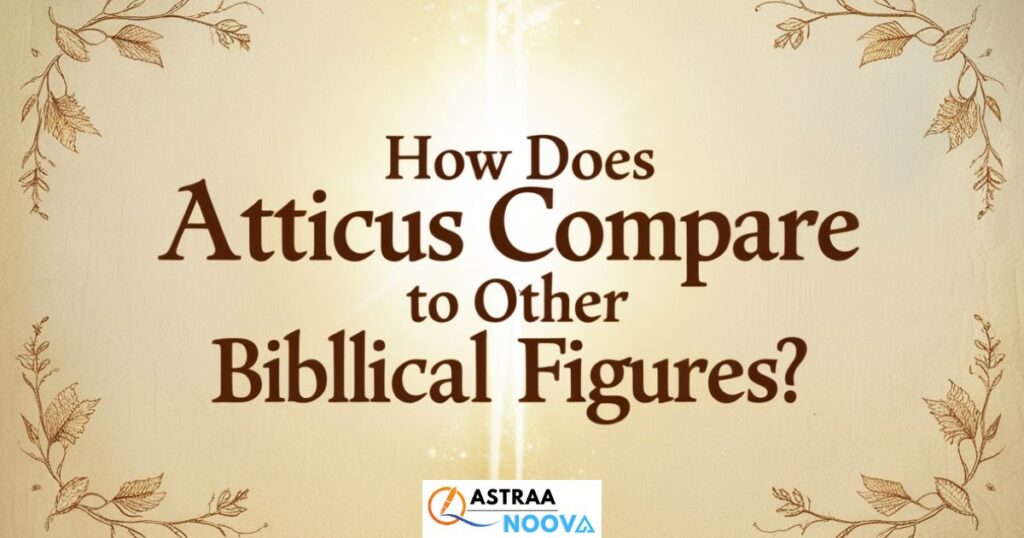Many people wonder about Atticus and his connection to biblical history. The interweaving of Greek culture and early Christianity often raises questions about influential figures from this period. Let’s explore the fascinating story behind this name and its significance in religious and historical contexts.
What is the significance of Atticus in the Bible?
The name Atticus carries deep cultural significance despite not appearing directly in biblical texts. Its roots in Greek origins reveal interesting connections to the world where early Christianity emerged and flourished.
The cultural landscape of the Roman Empire played a crucial role in shaping how we understand biblical narratives. During this period, Greek intellectual traditions merged with emerging Christian thought, creating a rich tapestry of cultural exchange.
In the context of early Christian narratives, names like Atticus represented the bridge between classical learning and new religious movements. This intersection of cultures helps us better understand the environment where biblical stories unfolded.
Is Atticus a biblical character?
The historical record is clear that Atticus does not appear as a character in any biblical texts. Neither the Old Testament nor the New Testament contains direct references to anyone bearing this name.
Understanding this absence requires exploring the broader context of names during the Roman era. While many Greek and Roman names appear in biblical accounts, Atticus represents a distinct cultural tradition that existed alongside early Christianity.
The name gained prominence among the Roman elite, symbolizing education and refinement. This cultural significance helps us understand why some might assume a connection to biblical narratives, even though none exists.
How is Atticus related to the early church?

The relationship between Atticus and the Early Church emerges through cultural intersection rather than direct involvement. During the formative years of Christianity, Greek and Roman influences shaped the movement’s development.
Notable figures like Atticus of Constantinople later played significant roles in church leadership. His work as a 5th-century patriarch demonstrates how the name became associated with Christian leadership long after the biblical period.
The cultural environment of the Roman Empire provided the backdrop against which early Christianity spread. Understanding this context helps explain how names and traditions merged in the developing faith.
What biblical texts mention Atticus?
A thorough examination of canonical texts reveals no mentions of Atticus. This includes both primary biblical sources and apocryphal writings associated with early Christian traditions.
This absence helps us understand the distinction between historical figures and biblical characters. While many Greek and Roman names appear in scripture, Atticus represents a parallel cultural tradition.
The lack of biblical references shouldn’t diminish the name’s historical significance. Instead, it helps us better understand the broader cultural landscape of the ancient world.
Who are the historical figures named Atticus?
Several prominent individuals bore the name Atticus during significant historical periods. Their lives provide valuable context for understanding the cultural significance of the name.
What do we know about Atticus Aemilius?
Atticus Aemilius represents an interesting case in historical research. While sometimes mentioned in discussions of Roman officials, evidence for this specific individual remains limited.
Scholarly debate continues about the historical reality of this figure. This uncertainty reminds us to approach historical claims with careful attention to available evidence.
The name combination reflects common Roman naming conventions, helping us understand how names functioned in ancient society.
Who was Herodes Atticus and his significance?
Herodes Atticus stands out as one of the most well-documented bearers of the name. As a wealthy philosopher and benefactor, he exemplified the cultural ideals associated with the name.
His contributions to public life included funding the Odeon of Herodes Atticus at the Acropolis of Athens. These architectural achievements demonstrate the intersection of wealth, culture, and public service.
Though not directly connected to biblical events, his life provides valuable insight into the cultural environment of the second century AD, when Christianity was spreading throughout the empire.
Read Also >> Where Does the New Testament Start? Discover Its Power
How does Atticus’s story contribute to biblical literature?
While not directly present in biblical texts, the cultural context surrounding the name Atticus enriches our understanding of the period when biblical literature emerged. The intersection of Greek intellectual traditions with early Christian thought created a dynamic environment.
During this period, educated Greeks and Romans often engaged with emerging Christian ideas. This cultural exchange influenced how biblical messages were communicated and understood across different societies.
The legacy of figures like Herodes Atticus helps us understand the sophisticated cultural landscape where early Christianity developed. Their stories provide valuable context for interpreting biblical narratives.
What are some lesser-known facts about Atticus?
Atticus Is a Greek Name with Roman Adoption
The name originated in Attica, the region surrounding Athens. Its evolution from Greek to Roman usage demonstrates the cultural fusion characteristic of the period.
The adoption of this name by the Roman elite reflected their appreciation for Greek learning and culture. This cultural exchange played a crucial role in shaping the environment where early Christianity spread.
Roman families who chose this name often valued education and philosophical pursuit, qualities that would later influence Christian intellectual traditions.
Herodes Atticus Funded Iconic Architectural Works
The lasting impact of Herodes Atticus extends beyond his lifetime through remarkable architectural achievements. His contributions to public works transformed ancient Athens.
The Odeon of Herodes Atticus remains a testament to his legacy, still standing at the Acropolis of Athens. This venue continues to host performances, bridging ancient and modern cultural expression.
His philanthropic activities throughout Greece and Asia Minor demonstrated how wealth could serve public interests, a theme that resonates with biblical teachings about stewardship.
Atticus Was a 5th-Century Patriarch of Constantinople
Atticus of Constantinople emerged as a significant figure in early Christian leadership. His role in opposing Nestorianism helped shape Orthodox Christian doctrine.
As a patriarch, he navigated complex theological debates that influenced the development of Christian thought. His leadership demonstrates how the name Atticus became associated with religious authority.
This historical connection helps explain the enduring influence of Greek names and concepts in Christian tradition.
What is the Greek origin of the name Atticus?
The name’s roots in Athenian culture reflect deep historical significance. Its meaning, “from Attica,” connects to one of the most influential regions in ancient civilization.
This etymology reveals how names carried cultural meaning in the ancient world. Understanding these origins helps us appreciate the rich context of biblical-era naming practices.
The prestige associated with Athenian learning and culture made this name particularly meaningful in both Greek and Roman societies.
Understanding the Meaning of the Name Atticus
The name Atticus carries deep significance beyond its literal meaning of “from Attica.” Its cultural associations reflect values of wisdom, learning, and civic virtue.
In Roman society, this name represented the height of cultural refinement and intellectual achievement. The choice of this name often indicated a family’s commitment to education and philosophical pursuits.
Modern interpretations have added layers of meaning, particularly associations with justice and moral integrity. This evolution shows how names can accumulate cultural significance over time.
How does Atticus compare to other biblical figures?

The cultural significance of Atticus provides interesting parallels with biblical figures, even though the name doesn’t appear in scripture. These comparisons offer valuable insights into the intersection of classical and biblical traditions.
Philosophical and Intellectual Parallel to Paul
The Apostle Paul’s engagement with Greek culture mirrors the intellectual traditions associated with the name Atticus. Paul’s famous address at the Areopagus in Athens demonstrated his ability to bridge cultural divides.
While Paul used philosophical concepts to communicate Christian truth, figures like Herodes Atticus represented the established intellectual tradition of the Roman Empire. This contrast helps us understand the cultural dynamics of early Christianity.
Patronage and Wealth: Atticus vs. Joseph of Arimathea
The theme of wealthy benefactors appears in both biblical and classical contexts. Joseph of Arimathea’s role in biblical narrative shares interesting parallels with the patronage of figures like Herodes Atticus.
Both demonstrated how wealth could serve higher purposes, though their motivations differed significantly. While Joseph’s actions stemmed from religious conviction, Herodes Atticus exemplified civic virtue and cultural patronage.
What can we learn from Atticus in ancient Greece?
The legacy of Atticus in Greek culture offers valuable lessons about leadership, education, and social responsibility. These insights remain relevant to contemporary discussions of values and ethics.
The Value of Education and Philosophy
The association of the name Atticus with intellectual achievement emphasizes the importance of learning and wisdom. This tradition of valuing education parallels biblical wisdom literature.
The combination of Greek intellectual traditions with practical leadership provides a model for balanced personal development. This synthesis of knowledge and action characterized the best of classical culture.
Philanthropy and Public Service
The example of public works and civic engagement set by figures like Herodes Atticus demonstrates the impact of directed wealth. Their contributions to society extended beyond personal achievement to benefit future generations.
Read Also >> Physical Signs of the Holy Spirit: Feel His Powerful Presence
How does Atticus relate to modern interpretations?
The name Atticus has gained renewed significance through modern literary and cultural references. Its association with justice and moral integrity continues to resonate with contemporary audiences.
Symbol of Justice and Integrity: Atticus Finch
The character of Atticus Finch in literature has become synonymous with moral courage and ethical leadership. His defense of Tom Robinson exemplifies the pursuit of justice despite social pressure.
This modern interpretation builds upon the classical associations of the name with wisdom and virtue. The character’s impact demonstrates how ancient values can speak to contemporary challenges.
Literary Symbol of Moral Leadership
The enduring appeal of Atticus as a symbol of leadership reflects both classical and modern values. Contemporary interpretations emphasize ethical decision-making and moral courage.
Literary works continue to draw upon the name’s associations with wisdom and justice. This cultural resonance demonstrates how ancient ideals remain relevant to modern moral discussions.
Cultural Renaissance
The name Atticus has experienced renewed popularity in contemporary culture. This renaissance reflects a broader interest in names that carry significant historical and moral weight.
Parents choosing this name often cite its connections to both classical learning and modern ethical leadership. This trend shows how ancient traditions continue to influence contemporary cultural choices.
Is Atticus in The Chosen in the Bible?
The appearance of an Atticus character in The Chosen TV series represents a creative interpretation rather than historical fact. This adaptation uses the character to explore the cultural dynamics of biblical times.
The series demonstrates how modern storytelling can use historical context to enhance biblical narratives. However, it’s important to distinguish between dramatic interpretation and historical record.
Atticus in The Chosen: A Modern Interpretation
The portrayal of Atticus in The Chosen offers a creative reimagining of Roman-Jewish interactions during biblical times. While this character isn’t from biblical texts, the series uses him to explore cultural dynamics.
The show’s interpretation helps viewers understand the complex relationship between Roman officials and Jewish communities. This creative addition provides context for the political and social environment of Jesus’ time.
Though fictional, this portrayal aligns with historical understanding of Roman administrators in Judea. It demonstrates how modern media can thoughtfully expand biblical narratives while remaining historically plausible.
Who was Atticus during Jesus’ time?
While no historical evidence confirms an Atticus during the ministry of Jesus, the name was common among educated Romans of the period. This helps us understand the social environment of first-century Palestine.
The absence of specific historical records shouldn’t surprise us, as many influential figures from this period remain unknown. Understanding the broader cultural context helps us appreciate the complexity of this historical era.
Final Thoughts
The story of Atticus reveals the rich interplay between classical culture and biblical history. Though not directly mentioned in scripture, the name’s significance helps us understand the world where Christianity emerged.
The enduring influence of this name, from ancient Athens to modern literature, demonstrates how cultural symbols evolve and maintain relevance. Its associations with wisdom, justice, and moral leadership continue to resonate.
Looking at the complete picture, we see how names and cultural traditions contribute to our understanding of history. The legacy of Atticus reminds us that exploring historical context enriches our appreciation of both classical and biblical traditions.
Bonus Information
The exploration of Atticus in biblical context reveals fascinating intersections of culture, faith, and history. While not a biblical figure, the name’s significance illuminates the rich cultural environment of early Christianity. From ancient Greek intellectual traditions to modern symbols of justice, Atticus represents enduring values that bridge classical and contemporary worlds. This journey through history helps us better understand both the biblical era and its continuing influence on modern thought and culture.

Multilingual faith educator exploring connections between language, spirituality, and dream symbolism.


















